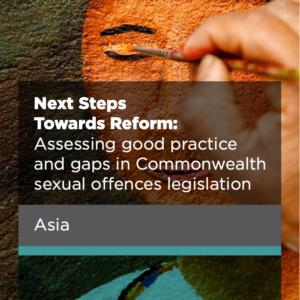Sri Lanka’s sexual offences laws are in the Penal Code (Cap 25) (PC). The Evidence Ordinance 1896 (as amended) contains relevant rules of evidence.
Many of Sri Lanka’s sexual offences laws assessed in this review do not meet good practice standards. Although the law criminalises non-consensual penetrative and non-penetrative sexual offences in accord with good practice standards, it also exempts rape in marriage in all circumstances except when the spouses are judicially separated or the victim/survivor is under 12 years. Sri Lanka established a committee to review the marital rape exemption, but at the time of writing the law had not been reformed. Not criminalising rape in marriage or providing for a defence of marriage to rape is discriminatory and contrary to good practice and international human rights law. It may also violate Sri Lankan constitutional equality guarantees.
Sri Lanka also criminalises consensual same-sex sexual activity for men and women. Laws that criminalise consensual same-sex sexual activity, such as ‘unnatural offences’ and ‘carnal intercourse against the order of nature’, should be repealed and all non-consensual sexual acts, including anal ‘rape’, should be included in the standard sexual assault provisions, such as ‘rape’ and other sexual assault, as well as in child sexual offences. All of these crimes should be gender-neutral.
There are very limited stand-alone child sexual assault offences in the PC. Apart from a pornography-related offence, which is not assessed in this review, there is only the crime of ‘sexual exploitation of children’. The general rape provision specifies rape of girls under 16 years. These offences are not comprehensive and do not expressly cover for example, sexual grooming, sexual communication with a child, or causing a child to watch sexual activity. There are no close-in-age defences, which are essential for good practice sexual offences laws as they prevent criminalising genuinely consensual sexual activity between young people of similar age when one or both is under the age of consent. The protection from child sexual assault is further weakened by the availability of the defence of marriage. Good practice requires no exception for marriage to a charge of rape.
Although the age of consent for opposite-sex sexual activity is 16 years, it lowers to 12 years when married. Non-consensual sexual intercourse should be expressly criminalised in every circumstance without exception. In addition, laws which permit marriage at a lower age than 18 do not reflect good practice standards based on international human rights. This is of even greater concern in jurisdictions, such as Sri Lanka, where there is a marital exemption to age of consent provisions.
Sri Lanka is a state party to some relevant international human rights treaties, including the Convention on the Elimination of All Forms of Discrimination against Women, Convention on the Rights of the Child, Convention on the Rights of Persons with Disabilities, Convention against Torture and Other Cruel, Inhuman or Degrading Treatment or Punishment and International Covenant on Civil and Political Rights.
Read more about the criminalisation of LGBT people in Sri Lanka.
The full assessment of Sri Lanka is available here.



